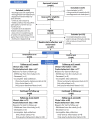My Diabetes Coach, a Mobile App-Based Interactive Conversational Agent to Support Type 2 Diabetes Self-Management: Randomized Effectiveness-Implementation Trial
- PMID: 33151154
- PMCID: PMC7677021
- DOI: 10.2196/20322
My Diabetes Coach, a Mobile App-Based Interactive Conversational Agent to Support Type 2 Diabetes Self-Management: Randomized Effectiveness-Implementation Trial
Abstract
Background: Delivering self-management support to people with type 2 diabetes mellitus is essential to reduce the health system burden and to empower people with the skills, knowledge, and confidence needed to take an active role in managing their own health.
Objective: This study aims to evaluate the adoption, use, and effectiveness of the My Diabetes Coach (MDC) program, an app-based interactive embodied conversational agent, Laura, designed to support diabetes self-management in the home setting over 12 months.
Methods: This randomized controlled trial evaluated both the implementation and effectiveness of the MDC program. Adults with type 2 diabetes in Australia were recruited and randomized to the intervention arm (MDC) or the control arm (usual care). Program use was tracked over 12 months. Coprimary outcomes included changes in glycated hemoglobin (HbA1c) and health-related quality of life (HRQoL). Data were assessed at baseline and at 6 and 12 months, and analyzed using linear mixed-effects regression models.
Results: A total of 187 adults with type 2 diabetes (mean 57 years, SD 10 years; 41.7% women) were recruited and randomly allocated to the intervention (n=93) and control (n=94) arms. MDC program users (92/93 participants) completed 1942 chats with Laura, averaging 243 min (SD 212) per person over 12 months. Compared with baseline, the mean estimated HbA1c decreased in both arms at 12 months (intervention: 0.33% and control: 0.20%), but the net differences between the two arms in change of HbA1c (-0.04%, 95% CI -0.45 to 0.36; P=.83) was not statistically significant. At 12 months, HRQoL utility scores improved in the intervention arm, compared with the control arm (between-arm difference: 0.04, 95% CI 0.00 to 0.07; P=.04).
Conclusions: The MDC program was successfully adopted and used by individuals with type 2 diabetes and significantly improved the users' HRQoL. These findings suggest the potential for wider implementation of technology-enabled conversation-based programs for supporting diabetes self-management. Future studies should focus on strategies to maintain program usage and HbA1c improvement.
Trial registration: Australia New Zealand Clinical Trials Registry (ACTRN) 12614001229662; https://anzctr.org.au/Trial/Registration/TrialReview.aspx?ACTRN=12614001229662.
Keywords: coaching; digital technology; health-related quality of life; mobile phone; self-management; type 2 diabetes mellitus.
©Enying Gong, Shaira Baptista, Anthony Russell, Paul Scuffham, Michaela Riddell, Jane Speight, Dominique Bird, Emily Williams, Mojtaba Lotfaliany, Brian Oldenburg. Originally published in the Journal of Medical Internet Research (http://www.jmir.org), 05.11.2020.
Conflict of interest statement
Conflicts of Interest: BO and DB received some royalty payments for the development of the scripts for the MDC platform.
Figures
References
-
- IDF Diabetes Atlaas. International Diabetes Federation. 2019. [2020-06-30]. https://www.diabetesatlas.org/en/resources/ - PubMed
-
- Lindner H, Menzies D, Kelly J, Taylor S, Shearer M. Coaching for behaviour change in chronic disease: a review of the literature and the implications for coaching as a self-management intervention. Aust J Prim Health. 2003;9(3):177. doi: 10.1071/py03044. - DOI
-
- Pirbaglou M, Katz J, Motamed M, Pludwinski S, Walker K, Ritvo P. Personal health coaching as a type 2 diabetes mellitus self-management strategy: a systematic review and meta-analysis of randomized controlled trials. Am J Health Promot. 2018 Sep;32(7):1613–26. doi: 10.1177/0890117118758234. - DOI - PubMed
Publication types
MeSH terms
Substances
Associated data
LinkOut - more resources
Full Text Sources
Medical
Miscellaneous


